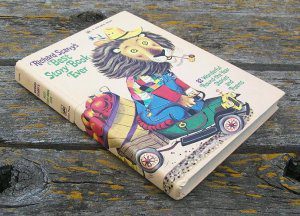 I used to love those Richard Scarry books when i was a kid. You know the ones: with lots of colorful, happy-looking animals, dressed like people, going about everyday sorts of activities. Some little vignettes thrown in here and there, but mostly, just some commentary on what the animals are doing, what kinds of stuff they have, and questions about what we might do in our day, and what kinds of stuff we might have, too… It sounds super dull, but when you are a kid who is learning to talk, and read, and order the world, it is just great stuff.
I used to love those Richard Scarry books when i was a kid. You know the ones: with lots of colorful, happy-looking animals, dressed like people, going about everyday sorts of activities. Some little vignettes thrown in here and there, but mostly, just some commentary on what the animals are doing, what kinds of stuff they have, and questions about what we might do in our day, and what kinds of stuff we might have, too… It sounds super dull, but when you are a kid who is learning to talk, and read, and order the world, it is just great stuff.
My mom dug the books out of moth balls for my kids, and now as a grown up i’m realizing: they’re a little bit sexist. And racist. And you know, there are little disturbing placement issues that jump out at me now. Like the baby pig, sitting in a grocery cart in front of the meat counter…looking at the bacon. Sick sense of humor much? Or an oblivious editor? I dunno. I don’t much care, either. The fact that I read them with an adult bias now should not keep my kids from enjoying them. I figure I will just edit as we go, for the world in which we now live. Rather than saying, “look, kids. Only the mommies cook dinner in this book, so only the mommies can cook dinner now. Go tell Dad that he should put down the spatula and go back to his pipe and newspaper.”
I have a new favorite primetime fix: ABC’s Once Upon a Time. The premise is that all the fairy tale characters–all of them!–have been placed under a curse, and transported to our world. To Maine, to be exact. And they go about their everyday lives, most of them having no recollection of who they are in that other domain. That’s cool and all, but what is really cool is each character’s ‘back story,’ as we see it unfold in the parallel universe of fairytale land. Did you ever wonder, for example, why Snow White’s step mother hates her? There’s a reason, and it makes the Evil Queen an almost sympathetic character. Did you ever wonder why the Beast (as in Beauty and the…) was a Beast? In this context, he is also Rumpelstiltskin, which adds dimension to many of the other stories, as well. Did it ever occur to you that, perhaps, Red Riding Hood is the big bad wolf?? At least, under a full moon she is.
Seriously, this show will blow your mind. It’s from the same people who wrote Lost, if that tells you anything about the complex layer of narrative at work here. I highly recommend it.
Unless, of course, you are very attached to the story as you know it. If you really need the comfort of characters falling into their ordered roles, of bad being bad, and good being good, every single time, then this show is not for you. If knowing that Prince Charming actually died– leaving us with a twin brother stand-in–is going to ruin the whole story for you, then you might not love this series.
Of course, if added dimension is disturbing to you, then you should never go back and read any story from your childhood, once you are grown. Because even without the wrench of primetime tv thrown into the stories that you love, there are other wrenches to be thrown. For instance, the fact that you are a grown up person, in a world that has continued to evolve over the last 2000, 200, or even 20 years. No story is ever the same twice, because the world in which we live cannot stay stagnant for that long…and because we, our own selves, are always changing. And therefore, our read of the world changes, too.
Last week, I wrote about reading scripture through this same kind of lens. God may not change. However, the way people interact with God, interpretting that intersection of human and holy, is constantly evolving. That post struck a nerve with folks who have questions about faith, the Church, and the Bible, but still see the value of those stories. It may not be the same value that they learned in Sunday school when they were 5–or even that they heard from the pulpit somewhere in adulthood–but it is Spirit value, nonetheless. Because what we find, when we revisit these stories as adults, is that they’ve gained dimension. Not from the efforts of a fiction writer, but from our own insight and experience, and from the quickly evolving world in which we live these lines of plot and discourse.
And yeah, sometimes we realize it’s a little bit sexist. Or racist. Or that the baby pig is sitting a liiiiiittle bit too close to the butcher’s block for our taste. Those parts, we let go. We translate for a new day, and we are left with a true core of meaning and value that cannot be shaken by time or space. Thus empowered, we read on. Because it’s still our story.
I heard the other day that Stephen King is ‘adding’ an episode of The Dark Tower series. Wtf?? It was perfect. It was infallible. It was finished. How can he add a thread of any worth to the greatest story ever told? Much as I’d like to be excited about the prospect, I don’t like the idea of him messing with ‘my’ story; which, in my head, is finished and was perfect the first time. But it occurs to me that, if i really felt he’d spun the perfect tale already, I shouldn’t read anything else, ever again. If I’m attached to the story I know, then I’m going to be disappointed every time the ‘world moves on,’ and every time I evolve.
So my other choice is to read this new episode through the lens of the world as I know it, in this time and place, and through all the insight and experience I’ve gained in the 7(?) years since I last visited Mid World. I can go there again with the gift of a past and the promise of a future, and see what the author has in store. Because the alternative is to just stop reading, and well, I might as well just hold my breath, forever.
It’s never finished, folks. We are never finished. Thanks be to the author of our days.












